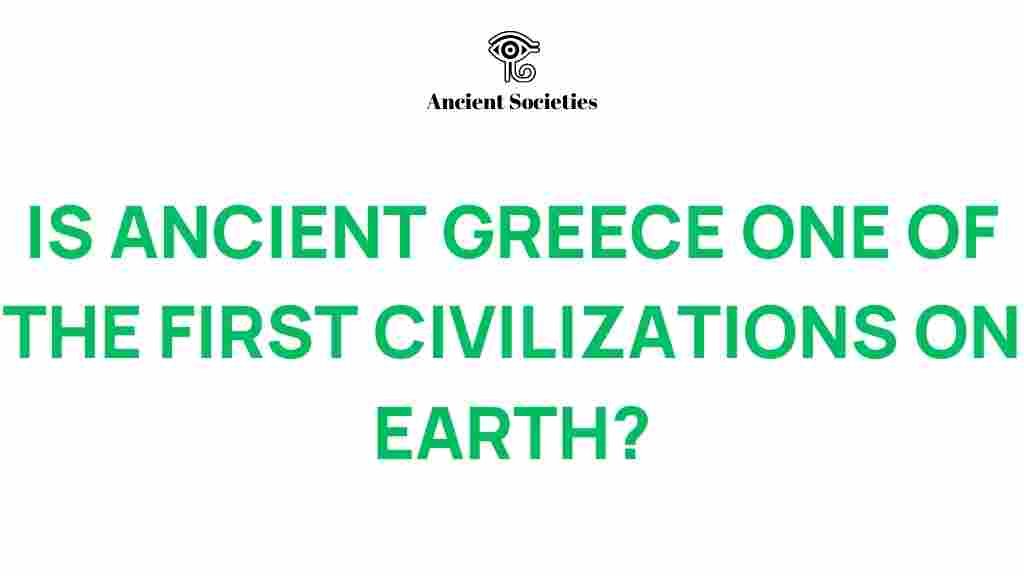Unraveling the Mystique: Was Ancient Greece Humanity’s First Civilization?
Ancient Greece holds a significant place in the annals of history, often celebrated as one of the most influential civilizations of all time. From its remarkable advancements in philosophy and democracy to its rich artistic and cultural expressions, Ancient Greece has shaped modern thought and society. But the question remains: was Ancient Greece truly the first civilization in human history? This article delves into the depths of archaeology, cultural achievements, and the societal structures that defined Ancient Greece.
The Foundations of Civilization
To understand whether Ancient Greece was the first civilization, we must first define what constitutes a civilization. Generally, a civilization is characterized by:
- Complex social structures and organizations
- Development of a writing system
- Artistic and architectural achievements
- Advancements in technology and innovation
- Political systems and governance
- A shared culture and religion
By these criteria, Ancient Greece indeed developed a sophisticated society. However, it is essential to explore other ancient cultures that also exhibited characteristics of civilization.
Comparative Civilizations: Mesopotamia and Egypt
Before Ancient Greece emerged as a notable civilization, two other cultures had already established complex societies. Mesopotamia, often referred to as the “cradle of civilization,” and Ancient Egypt were both flourishing well before the rise of Greek city-states.
Key highlights of these civilizations include:
- Mesopotamia: Known for its innovations such as the wheel, cuneiform writing, and the Code of Hammurabi, Mesopotamia laid the groundwork for urban development and governance.
- Ancient Egypt: With monumental architecture like the pyramids, a rich pantheon of gods, and a complex system of hieroglyphics, Egypt demonstrated advanced societal organization and cultural achievement.
While Ancient Greece made significant contributions to innovation and philosophy, it is crucial to recognize that other civilizations laid the foundational stones of societal development. Thus, the label of “first civilization” may vary based on perspective.
Ancient Greece: A Unique Civilization
Despite the presence of older civilizations, Ancient Greece achieved outstanding feats that set it apart in the history of humanity. Let’s explore some of the distinctive features of Ancient Greek civilization.
Society and Culture
Ancient Greek society was characterized by a strong sense of community and identity. The city-state, or polis, was the core of Greek life. Major city-states included Athens, Sparta, and Corinth, each with its unique governance and cultural practices.
Key cultural aspects of Ancient Greece include:
- Democracy: Particularly in Athens, democracy flourished, allowing citizens to participate in decision-making.
- Philosophy: Philosophers like Socrates, Plato, and Aristotle laid the groundwork for Western thought.
- Art and Theater: Greek art and drama, exemplified by the works of Sophocles and Euripides, continue to influence modern literature and performance.
Innovation and Science
Ancient Greece was also a cradle for innovation and scientific thought. The Greeks made groundbreaking contributions in various fields:
- Mathematics: Euclid’s elements and Pythagorean theorem are foundational to mathematics today.
- Astronomy: Figures like Aristarchus proposed heliocentric models long before Copernicus.
- Medicine: Hippocrates, often referred to as the “Father of Medicine,” laid the ethical foundations for medical practice.
Archaeological Evidence
Through archaeology, we gain insights into the lives and practices of Ancient Greeks. Excavations across Greece have uncovered remarkable artifacts, structures, and remnants of daily life:
- The Acropolis: This iconic site in Athens symbolizes the architectural prowess of the Greeks.
- Palace of Knossos: Located in Crete, this Minoan site challenges the notion of Greek civilization’s beginnings, suggesting complexity before the classical age.
- Pottery and Artifacts: Various pottery styles and inscriptions provide glimpses into the cultural and social practices of the time.
These archaeological findings not only highlight the sophistication of Ancient Greece but also reveal connections to earlier civilizations, suggesting a continuum rather than a definitive beginning.
Challenges in Defining the First Civilization
Determining the “first civilization” involves navigating several challenges:
- Timeframes: Civilizations often overlap, and chronological boundaries can be fluid.
- Criteria for Civilization: Different societies may meet various aspects of civilization to different extents.
- Regional Variations: Civilizations in disparate locations may develop independently, complicating comparisons.
As such, it is essential to approach the concept of the “first civilization” with nuance, recognizing the contributions of various cultures, including Ancient Greece.
Conclusion: The Legacy of Ancient Greece
In concluding our exploration of whether Ancient Greece was humanity’s first civilization, it becomes clear that while Ancient Greece was not the first, its contributions to democracy, philosophy, and culture are unparalleled. The legacy of Ancient Greece continues to influence modern society, shaping our ideas about governance, ethics, and the arts.
While earlier civilizations like Mesopotamia and Egypt laid the groundwork for societal development, Ancient Greece’s unique innovations and cultural achievements solidified its place in history as a cornerstone of Western civilization. For more insights into the fascinating world of ancient cultures, visit here.
In pondering the question of civilization’s origins, we recognize that humanity’s journey is a tapestry woven from diverse threads of culture, innovation, and societal development. Ancient Greece, with its rich and complex history, undoubtedly remains a significant chapter in this ongoing story.
This article is in the category History and created by AncientSocieties Team
